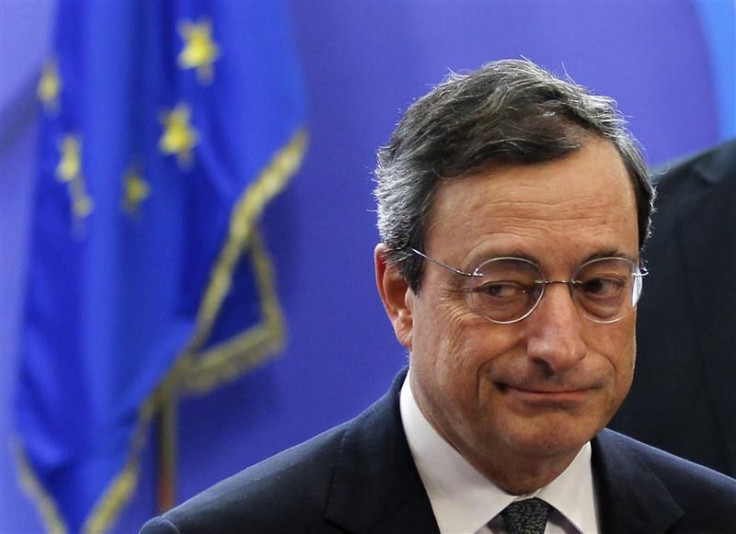ECB Holds Rates While Policy Package Takes Effect

(REUTERS) -- The European Central Bank left interest rates on hold on Thursday, pausing to assess the impact of back-to-back cuts and a slew of other measures it unleashed late last year that are showing some signs of helping fight the euro zone debt crisis.
The ECB, holding its first policy meeting of this year, held its benchmark rate at 1.0 percent, matching the lowest level ever. The decision was in line with market expectations.
Financial markets showed little reaction. The euro and benchmark German bund futures were both unmoved by the decision.
This confirms our expectation that the ECB wants to stay in wait-and-see mode at the moment and digest what the latest data are telling them about the magnitude and depth of the recession in the euro area, said Nomura economist Jens Sondergaard.
Even though recent weeks have seen some slightly encouraging data on the economy, it is too early for the ECB to change its tack only a month after its most recent set of forecasts and it is likely to keep its tone cautious.
Attention will now shift to ECB President Mario Draghi's 1330 GMT news conference, with markets looking for any sign the bank could steer rates into unchartered territory in the coming months - most analysts expect a cut in February or March.
To fight the euro zone crisis, the ECB last month started giving banks ultra-long loans (LTROs), eased collateral rules and kept buying government bonds - as well as cutting rates for the second time since Draghi took over the presidency on November 1.
French President Nicolas Sarkozy wants banks to use the new loans to buy sovereign bonds and strongly bid debt auctions in Spain and Italy on Thursday suggested some may be doing that, with analysts saying abundant liquidity helped support demand.
The ECB will probably want to assess what to make of the LTRO uptake and whether the balance sheet expansion this LTRO basically implied is feeding into the banking sector and how it is affecting the sovereign debt crisis, said Sondergaard.
Spanish and Italian yields both fell at Thursday's auctions.
It's too early to say whether this is linked directly to the LTROs but the yield movements should suggest that some of the sovereign debt crisis is abating, Sondergaard added.
At the first chance to get 3-year funds, banks took a record amount of 489 billion euros in late December, though so far much of the money has returned to the ECB as overnight deposits.
Due to the generous liquidity provision and a bond-buying program, the balance sheet of the ECB and euro zone national central banks has ballooned by more than 600 billion euros to 2.688 trillion in the last four months.
BOND BUYS
Analysts will be studying Draghi's comments on this to see whether the balance sheet growth will continue or if the ECB is starting to get more wary of the risks that this brings with it.
Especially interesting in this regard will be comments on government bonds - the ECB has spent 213 billion euros on bonds under the program so far even though some policymakers have openly questioned its effectiveness.
Now that the European bail-out fund is becoming operative and has the right to buy bonds, the ECB could spend less, but it is unlikely to be more communicative on this subject as it wants to keep its options open.
Everyone is looking for more clarity on bond-buying, but nothing has changed, ING economist Carsten Brzeski said. They will continue on this thin line of doing something, but keeping pressure on governments.
Greek woes will also be front-and-centre at the news conference, with negotiations about the private sector taking a hit on its holdings of the country's debt heating up.
The ECB has persistently argued against private sector involvement (PSI), correctly forecasting that it would increase contagion risks, and Draghi could offer himself a pat on the back for that.
However, he is unlikely to join ECB policymaker Athanasios Orphanides, who last week called for a reversal of PSI. Draghi is expected to merely say that the country has to stick to the conditions of the EU/IMF aid program.
Analysts also see the ECB remaining tight-lipped on its opinion about providing the IMF with euro zone central bank funds to help countries mired in the debt crisis, being careful not to close the door on that option.
(They'll just say that) it should be done in a way so that it is not considered indirect aid for governments, Brzeski said.
(Reporting by Sakari Suoninen and Paul Carrel,; editing by Stephen Nisbet)
© Copyright Thomson Reuters {{Year}}. All rights reserved.





















